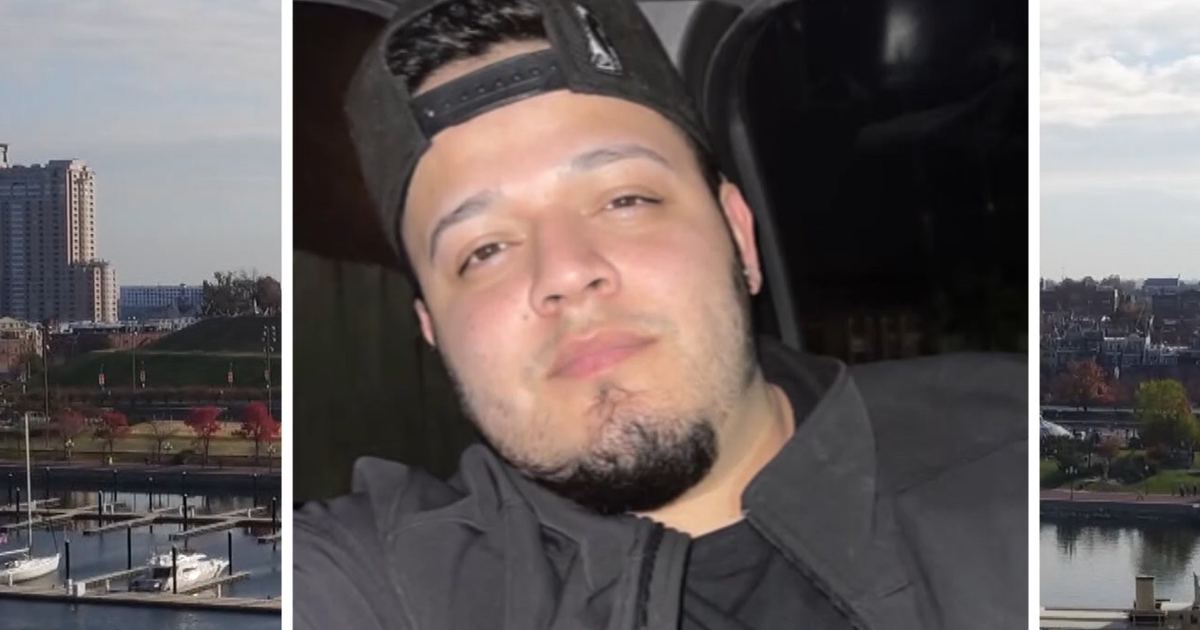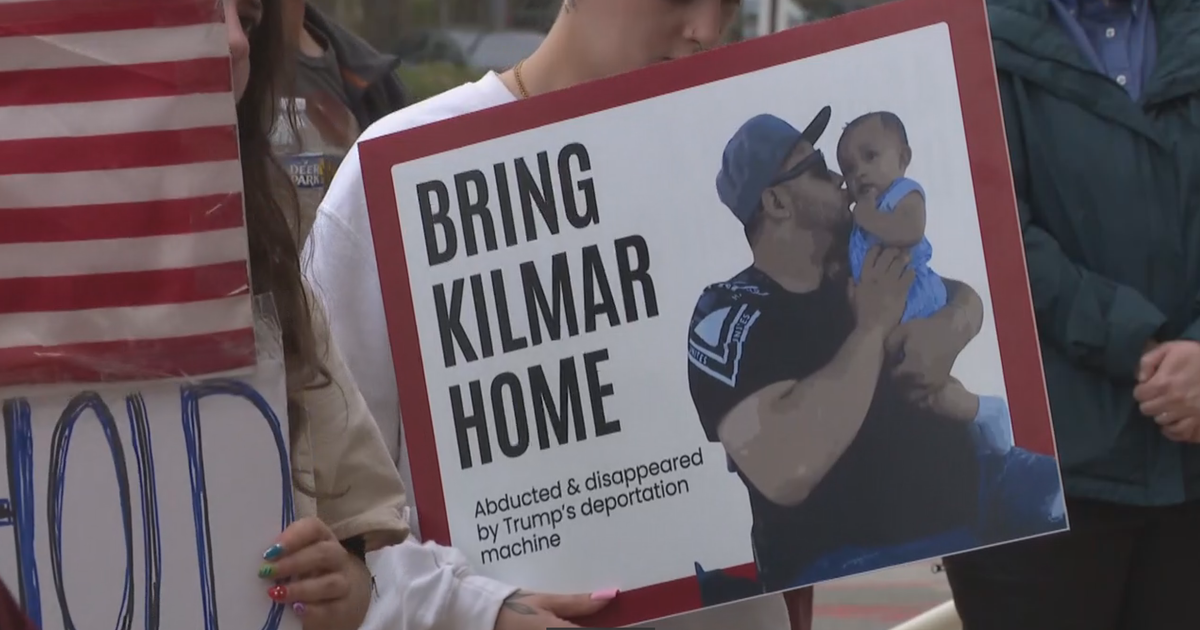Maryland father sues U.S. officials after being deported to El Salvador prison
A Maryland father who was deported last month to El Salvador is now suing Secretary of Homeland Security Kristi Noem, Acting Director of U.S. Immigration and Customs Enforcement Todd Lyons and several other federal officials.
Kilmar Armando Abrego Garcia, an El Salvador native, said a judge granted him federal protection in 2019, which should have prevented him from being sent to his native country.
"But defendants found those legal procedures bothersome, so they merely ignored them and deported Abrego Garcia to El Salvador anyway, ripping him away from his U.S.-citizen wife and his disabled U.S.-citizen child," the lawsuit says.
Court documents show that ICE admitted Abrego Garcia's deportation was due to an error, but they are not taking action to return him to the U.S.
Abrego Garcia, who lives in Prince George's County, Maryland, was deported in March 2025. His lawyers allege this happened without any legal proceeding and in violation of the "withholding of removal" order issued by an immigration judge in 2019.
According to the lawsuit, Abrego Garcia does not have a criminal history and has never been charged with a crime in the U.S., El Salvador or any other country.
ICE alleges gang affiliations
Prior to his 2019 protection order, Abrego Garcia was taken into police custody for alleged gang ties. He was questioned but never charged with a crime.
During a court appearance, ICE argued that Abrego Garcia was a danger to the community and an active gang member in MS-13's Westerns clique, which operates out of Long Island, New York.
According to his attorneys, the only evidence presented of his gang ties was allegations by a confidential informant and the fact that Abrego Garcia was wearing a Chicago Bulls hat and hoodie at the time of his arrest.
An immigration judge granted Abrego Garcia a "withholding of removal protection," a decision that ICE did not appeal. He was then released from custody and returned to his home in Prince George's County.
Since that time, Abrego Garcia's attorneys said he gained full-time employment as a sheet metal apprentice.
He is required to check in with ICE once a year as a condition of his protection status. His most recent check-in was on January 2, 2025.
Arrested and deported
On March 12, 2025, Abrego Garcia was pulled over by an ICE officer who identified himself as part of Homeland Security Investigations. He told Abrego Garcia that his status had changed and detained him, according to the lawsuit.
Between March 12 and March 15, Abrego Garcia was moved to different locations across the country. During a call to his wife after his arrest, he said he was again being questioned about gang affiliations. During a later call, he reported being told that he would see an immigration judge soon.
During a conversation with officials at one detention center, his wife said she was told that "El Salvador was asking for him."
On March 15, he told his wife he was being deported to El Salvador and was told he was being sent to CECOT, a Terrorism Confinement Center, according to the lawsuit.
The lawsuit requests Abrego Garcia's return to the U.S. or to the U.S. Embassy in El Salvador and further requests that the U.S. government end payment to the government of El Salvador.
Trump administration responds
ICE officials have admitted that Abrego Garcia's deportation was due to an "administrative error," but are opposing the request to have him returned to the U.S., according to court documents.
Abrego Garcia was deported from the U.S. on one of several flights that sent alleged gang members to the CECOT.
CBS News reported that the March 15 deportation flights carried 238 Venezuelans and 23 Salvadorans, all of whom were described by officials as gang members.
In court documents, the Department of Justice (DOJ) said federal courts do not have the authority to bring Abrego Garcia home since he is now being held by the government of El Salvador and is no longer in U.S. custody.
According to the DOJ, El Salvador did not indicate that it will consider the request to return Abrego Garcia.
DOJ officials further argue that there is no proof Abrego Garcia will be harmed in prison or by family separation.
Abrego Garcia's attorney argues U.S. can order his return
In an interview with CBS News, Abrego Garcia's attorney, Simon Sandoval-Moshenberg, argued that the court can order Abrego Garcia's return to the U.S. He admitted that Abrego Garcia being in the custody of a prison presents challenges.
"When a violation of law has occurred, the court has power to order that that be remedied and that the parties be returned to their original positions. The only sort of problem in this case is that he's currently inside the jail, right?" Sandoval-Moshenberg said.
According to Sandoval-Moshenberg, the U.S. has taken action in the past when people were wrongfully deported.
"I've handled several erroneous deportation cases in the past, including under the first Trump administration, and every other time that that happened, as soon as I essentially convinced them that they messed up. Department of Justice, Department of Homeland Security, bent over backwards to try to fix it. Right now, they haven't taken a single step," Sandoval-Moshenberg said.
From El Salvador to Maryland
Court documents detail how Abrego Garcia left El Salvador at 16 years old to get away from gang violence. In 2011, Abrego Garcia entered the U.S. and traveled to Maryland, where his older brother, who is a U.S. citizen, lived.
Abrego Garcia met Jennifer Vasquez Sura - a U.S. citizen - in 2016. She had two children from a previous relationship and eventually had another with Abrego Garcia. He supported himself and the children by working in the construction industry, according to court documents. They later married in 2019.
Abrego Garcia's wife speaks out
Vasquez Sura, expressed her concerns during an interview with CBS News, saying her husband told her he could be sent to the CECOT prison in El Salvador.
"I was very scared...because I've seen news of that prison and I know they send criminals there. And my husband is not a criminal," she said.
Vasquez Sura said after her husband was deported, she was able to identify him in a photo that showed inmates in the prison.
"When I saw it, I immediately broke down, because I knew it was him... I was scared for his life," she said.
"He's not a criminal," Vasquez Sura said. "My husband is an amazing person, an amazing father."
What is a "withholding of removal" protection order?
According to Abrego Garcia's lawsuit, federal laws prevent the government from removing noncitizens who hold certain protections and sending them to a country where they are likely to face persecution.
To obtain his "withholding of removal" protection order in 2019, Abrego Garcia had to prove that he was likely to suffer persecution due to race, religion, nationality, membership in a social group or political opinion.
With that protection granted, the Department of Homeland Security (DHS) is supposed to be prevented from sending the person to the country designated in the order, unless the protection is terminated. However, that person can still be deported to any other country.
There are federal regulations allowing the protection to be removed, though according to Abrego Garcia's lawsuit, DHS must first reopen the case with an immigration judge. After the "withholding of removal" order has ended, the person can be removed from the country.
CBS Baltimore has reached out to Baltimore's ICE office for further comment.



